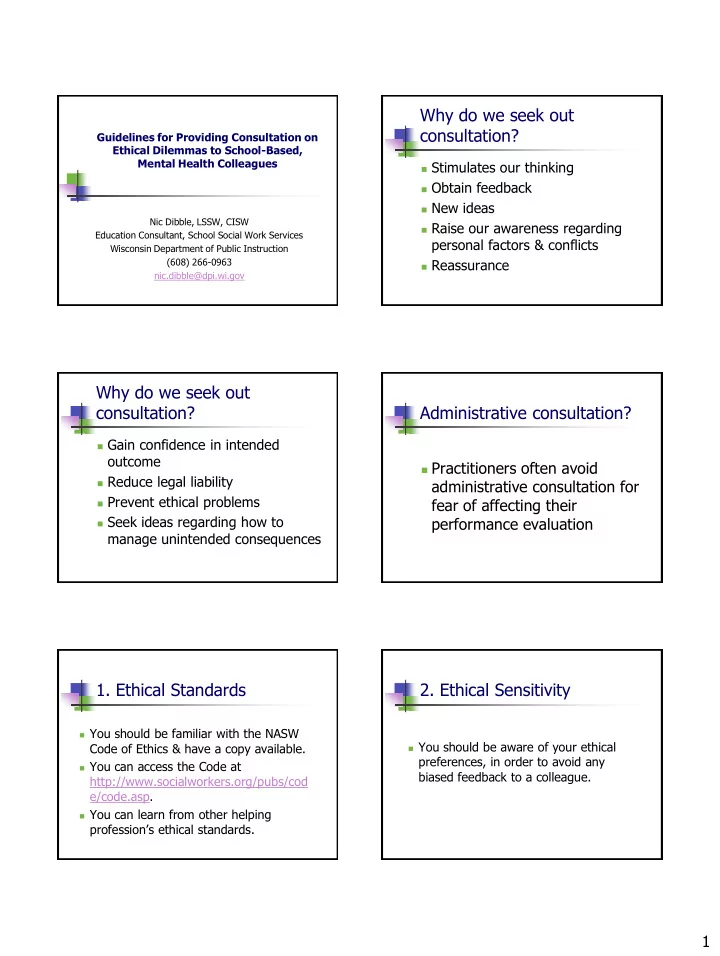

Why do we seek out consultation? Guidelines for Providing Consultation on Ethical Dilemmas to School-Based, Mental Health Colleagues Stimulates our thinking Obtain feedback New ideas Nic Dibble, LSSW, CISW Raise our awareness regarding Education Consultant, School Social Work Services personal factors & conflicts Wisconsin Department of Public Instruction (608) 266-0963 Reassurance nic.dibble@dpi.wi.gov Why do we seek out consultation? Administrative consultation? Gain confidence in intended outcome Practitioners often avoid Reduce legal liability administrative consultation for Prevent ethical problems fear of affecting their Seek ideas regarding how to performance evaluation manage unintended consequences 1. Ethical Standards 2. Ethical Sensitivity You should be familiar with the NASW You should be aware of your ethical Code of Ethics & have a copy available. preferences, in order to avoid any You can access the Code at biased feedback to a colleague. http://www.socialworkers.org/pubs/cod e/code.asp. You can learn from other helping profession’s ethical standards. 1
3. Timing 4. Listen Be sure you have the necessary time to Begin the interaction simply by spend with your colleague before you listening. agree to provide consultation. Allow your colleague to explain the Assess the level of urgency and, if ethical dilemma & why she/he is needed, schedule another time to meet struggling with how to manage it. or refer your colleague to someone else who can help. 5. Assess your competence 6. Assess your influence Assess your level of competence to provide The younger your colleague is, the consultation to your colleague on this situation. greater your professional responsibility. Ethical Clinical The more your colleagues respect your Legal work, the more power you have to If your competence is limited in some manner, influence their decision-making. inform your colleague. If your competence is not adequate, refer your colleague to another professional with the requisite competence to help. 7. Ask questions 8. Empathize & encourage Ask clarifying questions to ensure you Empathize with your colleague. fully understand the situation. Acknowledge that the situation is a Offering any feedback based upon difficult one. incomplete information is not Encourage use of consultation to constructive & may actually cause manage ethical dilemmas. harm. 2
Ethical Decision-Making 9. Ask more questions Process Know yourself, your profession’s code of ethics & 1. Ask questions designed to determine if the relevant laws. your colleague has followed the Analyze the predicament. 2. recommended steps of a decision- Seek consultation. 3. making model for mental health Identify courses of action. 4. professionals facing an ethical dilemma. Manage the clinical concerns. 5. Enact the decision. 6. If appropriate, share an ethical Reflect on the process & outcomes. 7. decision-making model that you find Raines & Dibble (2011) helpful with your colleague. http://www.us.oup.com/us/catalog/general/subject/SocialWork/?vi ew=usa&view=usa&ci=9780199735853 11. Share knowledge & 10. Professional differences experience If you believe that your colleague may Share any specific knowledge you may have have handled the situation differently about how to successfully manage this kind of ethical dilemma. than you would have, do not rush to judgment. Share any experience you may have regarding how a similar situation was Take care to distinguish between an managed with a poor outcome. ethical violation & a difference of Cautioning a colleague to avoid a particular professional opinions. course of action is valuable, as well. 12. Scope of response 13. Other Professions Remember that while some ethical A colleague may approach you with a standards may be parallel across very narrow request for consultation. professions, they are still different. Do not feel obligated to provide a Offering your profession’s perspective is comprehensive, consultative response helpful. as is outlined in these guidelines. It is not constructive or appropriate to hold your colleague accountable to your profession’s ethical standards. 3
Example: Duty to warn Example: Duty to warn School nurses School psychologists “Duties of confidentiality, however, are not “Information is revealed only with the informed absolute and may need to be modified in consent of the child, or the child’s parent or order to protect the patient, other innocent legal guardian, except in those situations in parties, and in circumstance of mandatory which failure to release information would disclosure for public health reasons.” result in clear danger to the child or others .” ANA Code of Ethics, 3.2 NASP Principles for Professional Ethics, III.A.9. Example: Duty to warn Example: Duty to warn School counselors School social workers “Keeps information confidential unless “The general expectation that social workers disclosure is required to prevent clear and will keep information confidential does not imminent danger to the student or others or apply when disclosure is necessary to prevent when legal requirements demand that serious, foreseeable, and imminent harm to a confidential information be revealed.” client or other identifiable person .” ASCA Ethical Standards for School Counselors, A.2.b. 14. Consult, don’t direct 15. Don’t be offended Resist the temptation to tell your Don’t be offended if your colleague colleague how to manage the situation. declines to follow your advice. Consultation is non-binding. Your goal should be to help your colleague come to his/her own decision There may be more than 1 ethical about how to manage this ethical course of action. dilemma. She/he must take responsibility for the decision, its outcomes, and any related ramifications. 4
16. Resources 17. Referral If you are not able to directly assist If you know of someone else or a your colleague, connecting your specific resource that you believe could colleague to someone who can help is a help your colleague, share that valuable service. information. 18. Personal Conflicts 19. Follow-up Use your clinical skills to manage any Check in with your colleague in the near perceived personal bias of your future to learn how the situation was colleague in a manner that will not elicit managed & what the outcomes were. a defensive reaction. You can learn from this experience, as You may wish to recuse yourself from well. any consultation on any issue where you have strong personal feelings. 5
Recommend
More recommend